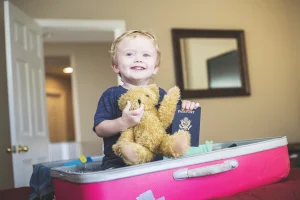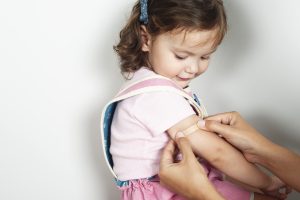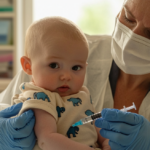
Co robić, gdy dziecko nagle znika ci z oczu? O zaginięciach małych dzieci mówi Agata Nowacka z Fundacji ITAKA
Ela Kowalska: Jakie są najczęstsze przyczyny zaginięć małych dzieci?
Agata Nowacka: Główna przyczyna zaginięć dzieci poniżej dziesiątego roku życia to niewłaściwa opieka ze strony opiekunów. I nie chodzi tutaj tylko o rodziców, ale również rodzeństwo czy babcie lub dziadków, którzy np. ze względu na swój wiek i ograniczenia zdrowotne nie są w stanie takiego małego dziecka dopilnować. Sprawy nie rozwiążemy, mówiąc dziecku: „pilnuj się”. Musimy pamiętać, że małe dzieci nie są w stanie ocenić niebezpieczeństw czy przewidzieć konsekwencji swoich zachowań. Z drugiej strony – są na etapie poznawania świata, wiele rzeczy jest dla nich ciekawych. My nie zwrócimy uwagi na sklepową wystawę, ale dla małego człowieka może być ona czymś fascynującym. Wystarczy, że zatrzyma się na chwilę, puści rękę rodzica, który coś sprawdza w telefonie. Albo podczas szukania odpowiedniego miejsca na plaży zatrzyma się w poszukiwaniu muszelek. Dlatego to my jako rodzicie i opiekunowie powinniśmy być uważni i świadomie opiekować się dzieckiem. Zwłaszcza gdy wychodzimy z nim w zatłoczone miejsce, takie jak np. centrum handlowe. Kolejna przyczyna zaginięć małych dzieci to porwania rodzicielskie – w naszym kraju odnotowuje się coraz więcej tego typu przypadków. W Polsce małe dzieci bardzo rzadko padają ofiarami przestępstw, większość przypadków to na szczęście zaginięcia krótkotrwałe.
Co należy zrobić, jeśli dojdzie do zaginięcia małego dziecka?
Niezależnie od tego, gdzie doszło do zaginięcia – należy powiadomić policję. Nie trzeba jechać osobiście na komisariat, można zadzwonić pod numer 112. Pamiętajmy też, że im szybciej zgłosimy zaginięcie – tym lepiej.
W Polsce nie ma żadnych przepisów mówiących, że należy odczekać ze zgłoszeniem 24 czy 48 godzin. W przypadku małego dziecka, które nie umie o siebie zadbać, liczy się każda minuta. Jeśli do zaginięcia doszło, gdy z dzieckiem było dwoje opiekunów, jeden może zawiadamiać policję, a drugi rozpocząć poszukiwania na miejscu. Gdy do zaginięcia doszło na plaży, w centrum handlowym czy na evencie plenerowym, trzeba jak najszybciej powiadomić ochronę i organizatorów, którzy mogą nadać specjalny komunikat. Warto powiedzieć, w co dziecko było ubrane, czy ma jakieś cechy szczególne. Kluczowe jest to, aby jak najwięcej osób w najbliższym otoczeniu dowiedziało się, że zaginęło dziecko. W takich sytuacjach naprawdę można liczyć na zrozumienie i pomoc obcych ludzi, którzy włączają się w pierwsze poszukiwania.
Czy i w jaki sposób można dziecko przygotować na taką sytuację?
Jak najbardziej można i trzeba dziecko przygotować na sytuację, w której się zgubi. Dziecko powinno nie tylko wiedzieć, jak się nazywa, ale również znać adres oraz numer telefonu jednego z rodziców. Niestety, z powodu stresu może o tym zapomnieć. Dlatego warto, aby wiedziało, kogo może poprosić o pomoc. Są to policjanci, strażacy, strażnicy miejscy czy ochroniarze. Warto opowiadać o służbach mundurowych, aby dziecko wiedziało, że w trudnych sytuacjach, gdy w pobliżu nie ma mamy i taty, może zwrócić się do nich po pomoc. Niestety wielu rodziców buduje negatywny wizerunek służb w oczach dziecka, strasząc, że jak będzie niegrzeczne to „pan policjant je zabierze”. Sama byłam niedawno świadkiem sytuacji, w której rodzice nie mogli sobie poradzić z dzieckiem. Akurat przejeżdżał patrol policji i jedno z nich powiedziało: „widzisz, policja już po ciebie przyjechała”. To bardzo złe, bo w sytuacji zagrożenia czy zaginięcia to dziecko nie będzie skłonne prosić o pomoc np. policjanta.

Agata Nowacka fot. archiwum prywatne
A przecież w takich przypadkach najbezpieczniej, jeśli dziecko chce skorzystać właśnie z pomocy służb mundurowych.
To prawda. W kontekście zaginięć bardzo ważne jest również nauczenie dziecka tego, że nie zawsze powinno być posłuszne dorosłym.
W jaki sposób to zrobić?
Zaczynając, chociażby od tego, aby pozwalać dziecku na decydowanie w tak prozaicznych sytuacjach, jak pożegnanie czy powitanie z bliskimi. Jeśli dziecko nie ma ochoty dać buziaka cioci czy babci, nie zmuszajmy go do tego. Chodzi o to, by szanować stawiane przez nie granice i nie uczyć bezwzględnego posłuszeństwa wobec dorosłych. Wtedy dziecko będzie bardziej asertywne. Dzięki temu będzie w stanie sprzeciwić się obcej osobie, która zaproponuje mu pomoc i zadeklaruje, że skoro się zgubiło, to zaprowadzi go do mamy. Takiej pewności siebie można również uczyć, czytając bądź opowiadając bajki. Warto także z dzieckiem przećwiczyć takie sytuacje. Zapytać je, co by zrobiło w sytuacji, gdyby się odłączyło od rodziców i jakaś obca osoba nalegała, że mu pomoże. Uświadomić, że gdy poczuje się zagrożone, ma prawo krzyczeć. Nauczyć komunikatów, których może w takich momentach użyć. Mogą to być zdania takie jak: „to nie mój tata”, „to nie moja mama”, „nie znam pana/pani”.

Polecamy
Idzie sezon na gotowanie dzieci. Nie zakrywaj wózka tetrą „na trumienkę”!
Nadchodzi lato i temperatury sięgające nawet 30 st. C. Na zewnątrz coraz więcej rodziców z dziećmi w wózkach – wiele z nich przykrytych tetrową pieluchą, aby uchronić malucha przed nadmiarem słońca. Lekarze alarmują: to jak włożenie dziecka do termosu; może narażać jego zdrowie, a nawet życie.
Ważna jest również świadomość przestrzeni – może się okazać, że gdy dziecko np. zgubi się na nieodległym placu zabaw, samo dotrze do domu.
Już od najmłodszych lat warto ćwiczyć zapamiętywanie drogi – do przedszkola, na plac czy najbliższego sklepu. Jest to również istotne, gdy wyjeżdżamy na wakacje i znajdujemy się w nowym, obcym otoczeniu. Wskaźnikami, które pomagają zapamiętywać trasę do domu, mogą być charakterystyczne elementy – kiosk, duże drzewo czy kolorowy budynek.
Chciałabym jeszcze podkreślić, żeby traktować to jak zabawę i przygodę – i np. na skrzyżowaniu zapytać dziecko: „to, w którą stronę powinniśmy pójść teraz?”, tak aby to ono podjęło decyzję i nas poprowadziło. W budowaniu i rozwijaniu świadomości dziecka bardzo ważna jest równowaga – z wiekiem powinno być ono świadome zagrożeń, ale nie należy go straszyć. Ważne są więc codzienne rozmowy, które pomagają budować zaufanie. Wtedy dziecko wie, że zawsze może się podzielić swoimi wątpliwościami i że weźmiemy je na poważnie. Dzięki temu, przykładowo, nie będzie bało się opowiedzieć o dziwnym dorosłym, przebywającym na placu zabaw lub kręcącym się pod przedszkolem.
Powiedziałaś, że większość przypadków zaginięć małych dzieci w Polsce to zaginięcia krótkotrwałe. Jaką zatem rolę w poszukiwaniu zaginionych dzieci odgrywa system Child Alert?
Celem systemu Child Alert jest szybkie i kompleksowe rozpowszechnienie informacji o zaginionym dziecku. Aby został uruchomiony, musi być spełnionych kilka warunków. M.in. istnieć uzasadnione podejrzenie, że dziecko padło ofiarą przestępstwa i że zagrożone jest jego zdrowie bądź życie. Ponadto z posiadanych przez policję informacji musi wynikać, że rozpowszechnienie komunikatu może w realny sposób przyczynić się do odnalezienia małoletniej osoby zaginionej. Służby muszą również uzyskać zgodę rodziców na rozpowszechnienie wizerunku dziecka. Jeśli przesłanki zostaną spełnione, to praktycznie za naciśnięciem jednego przycisku system jest aktywowany, a informacja o zaginionym dziecku wraz z jego zdjęciem pojawia się na terenie całego kraju i poza jego granicami. Wtedy też aktywowany jest specjalny numer 995, pod który można dzwonić, jeśli posiada się jakiekolwiek informacje o zaginionym dziecku. Do tej pory system Child Alert był uruchamiany w Polsce cztery razy. Należy podkreślić, że policja zawsze traktuje zaginięcia małych dzieci priorytetowo. Zaginięcia są przypisywane do jednego z trzech poziomów, małe dzieci zawsze trafiają do poziomu pierwszego, tego o najwyższym priorytecie. Wiąże się to z podniesieniem alarmu w jednostce, w której zostało zgłoszone zaginięcie, oraz z podjęciem wszystkich możliwych działań służących jak najszybszemu odnalezieniu dziecka.
A jaką rolę w poszukiwaniu zaginionych dzieci odgrywa numer 116 000?
116 000 to europejski numer interwencyjny Telefonu w Sprawie Zaginionego Dziecka i Nastolatka, pod którym można uzyskać bezpłatną i natychmiastową pomoc w przypadku zaginięcia dziecka. Powstał on na mocy jednej z unijnych dyrektyw. Linia działa więc w każdym kraju UE i w każdym państwie jest obsługiwana przez organizację pozarządową zajmującą się pomocą dzieciom bądź osobom zaginionym.
W Polsce za jego obsługę odpowiada Fundacja ITAKA. Linia służy wszystkim, których dotyka problem zaginięcia dziecka. Mogą do nas dzwonić więc rodzice, opiekunowie, a także dzieci. Pod numerem telefonu można zgłosić zaginięcie osoby poniżej osiemnastego roku życia, a także uzyskać wsparcie prawne, poszukiwawcze oraz psychologiczne. Można też anonimowo przekazać informację o zaginionym dziecku/nastolatku. Na numer 116 000 zadzwonić mogą też osoby, których dziecko padło ofiarą porwania rodzicielskiego. Na linii dyżurują też prawnicy i psychologowie, którzy pomogą także w tej sytuacji.
W sieci pojawiają się historie zaginięć dzieci, które, mimo iż brzmią mało wiarygodnie, zyskują na popularności i są mocno rozpowszechniane m.in. w mediach społecznościowych. Jak te miejskie legendy mają się do rzeczywistości?
Tak, jak powiedziałam na początku – w przypadku zaginięć małych dzieci w Polsce, niesłychanie rzadko mamy do czynienia ze zdarzeniem kryminalnym takim jak np. porwanie. Miejskie legendy są o tyle niebezpieczne, że mogą wywołać olbrzymi strach i lęk wśród rodziców. Gdy się im jednak przyjrzymy bez emocji, okazuje się, że nie mają one najmniejszego sensu. W pracy w Fundacji spotykamy się z tymi miejskimi legendami, część z nich na przestrzeni lat ewoluuje. Ciężko z nimi walczyć, gdyż ich środowiskiem naturalnym są social media i promujące te treści algorytmy. Warto też pamiętać, że w social mediach często możemy natrafić na fake newsy. A fake newsy żyją dzięki emocjom, które wywołują. Miejskie legendy idealnie się więc wpisują w tę charakterystykę. Jeśli więc trafimy na taką sensacyjną informację, warto zachować zdrowy rozsądek i przede wszystkim sprawdzić jej źródło.
O CZYM PAMIĘTAĆ, ŻEBY NIE ZGUBIĆ DZIECKA?
- Naucz swoje dziecko podstawowych zasad bezpieczeństwa – miej pewność, że wie jak brzmi jego pełne imię i nazwisko, zna swój adres i numer telefonu do rodziców. Niech będzie nauczone, by w przypadku, gdy się zgubi, zostało w jednym miejscu i głośno krzyczało. Przypomnij mu, by o pomoc prosiło policjantów, ochroniarzy lub strażników miejskich, lecz by nie oddalało się z nieznajomym i nie wsiadało do cudzego samochodu
- Ustal miejsce kontrolne – będąc w nowym miejscu, ustal z dzieckiem i resztą uczestników wyjścia jedno charakterystyczne miejsce, w którym spotkacie się w razie rozdzielenia
- Napisz dziecku swój numer telefonu – najlepiej na specjalnej opasce, którą można kupić w wielu sklepach
- Kolorowy ubiór ma znaczenie – kolorowe, świecące, rzucające się w oczy ubrania pozwalają łatwiej wyróżnić się z tłumu i odnaleźć dziecko w zatłoczonej przestrzeni. Charakterystyczny ubiór dorosłego pomoże również dziecku w odnalezieniu go.
Agata Nowacka – psycholog od ponad 10 lat związana z Fundacją ITAKA. Koordynuje pracę Zespołu Poszukiwań i Identyfikacji oraz wspiera rodziny i bliskich osób zaginionych. Jako prelegentka uczestniczy w konferencjach i szkoleniach skierowanych do instytucji profesjonalnie zajmujących się poszukiwaniem osób zaginionych.








































